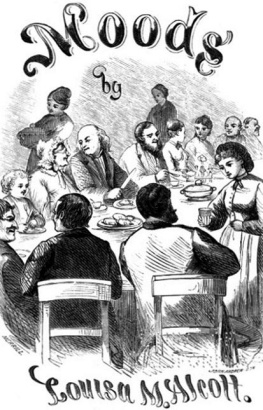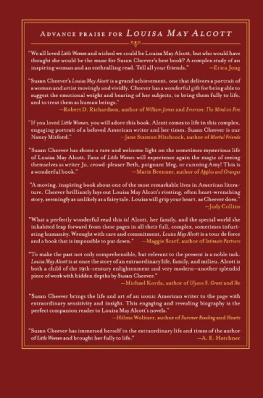Harriet Reisen writes and produces for public radio and television, most recently the first film biography of Louisa May Alcott (with producer-director Nancy Porter) for PBS American Masters . She lives in Massachusetts with her husband, son, and daughter-in-law.
Book illustration gallery and American Masters DVD at www.louisamayalcott.net .
Praise for
Louisa May Alcott: The Woman Behind Little Women
The Wall Street Journal 10 Best Books of 2009
Bookpage Top 10 Nonfiction Books of 2009
January Magazine Top 10 Biographies of 2009
Booklist Top 5 Adult Books for Young Adult Readers
Massachusetts Book Award Finalist for Best Nonfiction 2009
At last, Louisa May Alcott has the biography that admirers of Little Women might have hoped for. A full and vivid portrait.
Melanie Kirkpatrick, The Wall Street Journal
Ms. Reisen is a master storyteller. With compassion and insight, she propels readers on to the next adventure, sacrifice, tragedy, and triumph. That happy sense of discovery is your reward in reading this masterful work by this talented new biographer.
Marion Elizabeth Rodgers, The Washington Times
Harriet Reisens Louisa May Alcott is terrific. The utterly compelling force of Alcotts personality has never been better described. I found the book compulsively readable; I couldnt put it down.
Robert D. Richardson, biographer of Ralph Waldo Emerson, Henry David Thoreau, and William James
Reisens story equalsand maybe bests[Alcotts] beloved book about the lively March sisters.
Lisa Shea, Elle magazine
This juicy bio is a page-turner.
Good Housekeeping
Harriet Reisen puts twenty years of study into a highly readable story. She casts a revealing new light upon an ambitious woman who was very much like her literary alter ego.
Joyce Senz Harris, The Dallas Morning News
Brilliantly researchedBeautifully and sympathetically written, [Reisens] biography will occupy an essential place on any Alcott bookshelf.
John Matteson, Pulitzer Prizewinning author of Edens Outcasts: The Story of Louisa May Alcott and Her Father
A deliciously palatable biography of the iconic writer whose life was as full of plot and character as any [she] invented.An absorbing portrait of the protean author whose life was no childrens book.
Kirkus Reviews
A lively, engrossing portrait of Louisa May Alcotts lifeAlcotts spirit shines through in Reisens retelling.
Associated Press
Reisens cinematic sensibility makes for a marvelous book, impossible to put down. With its finely drawn portraits of characters who come alive in a couple of sentences, [it is] a book rich in affecting scenes and colorful anecdotes and a fine sense of both the intimate personal detail and the historic backdrop of Alcott and her family and their place amid the great minds of nineteenth-century New England.
Jean Westmoore, Buffalo News


To Nancy Porter,
treasured friend and colleague
Contents

Preface

Like so many other girls, I fell under the spell of Louisa May Alcott when my mother presented Little Women to me as if it were the key to a magic kingdom. I was taken into Louisas story so completely that a book with covers and pages has no place in my memory of the experience. While I was there, by my mothers decree, normal life was suspended. Jelly omelets were delivered to my room on bed trays, and sleep was optional. At such a time, school was out of the question. Jo March was coming to take up residence in my heart, a companion for life, to endow me with a little something of Louisa Alcotts own wise, funny, sentimental, and sharply realistic outlook.
Coming to the end of Little Women left me feeling as Louisa did when she emerged from a vortex (one of her all-absorbing periods of writing): cranky, bereft, and lamenting that never again would I read Little Women not knowing how it came out. The next long rainy weekend my grandmother, tipped off by my mother, showed up for a visit bearing the remaining seven of Alcotts juvenile novels. I polished off one of them before the sun came out and Grandma went home; the rest by the end of the month. I had gobbled Alcott all up without coming close to satisfying my appetite for her work.
Later, my mother made me aware of Louisa Alcott, the woman behind Little Women . Mom felt deep sympathy for Louisas losses, which resembled her own. Her fury on Louisas behalf toward Bronson Alcott (Louisas father, whose resemblance to her own father she never recognized) was as pure and freely expressed as any tirade she directed at a teacher she felt had done me wrong. So it was my mothers attachment to Louisas story that kindled my own interest, and soon after I moved to the Boston area in my twenties I took myself to the Alcotts modest doorstep in Concord.
Orchard House is chockablock with things the Alcotts made and ate from and wore and painted and used so much that I imagine their smell must still cling to them. Downstairs in Bronsons study are his books, his hat, his satchel, and the ingenious little mantel clock to be ignored when neighbor Ralph Waldo Emerson came by to philosophize, and to take from its stand and put in his pocket when he went off on lecture tours. In the entry are palimpsests of Mays frieze of silhouettes of the famous friends and neighbors who visited. Lizzies picture hangs by her melodeon in the dining room where Abbys green-and-white Coalport china set is displayed. Upstairs a trunk contains costumes the sisters made for their theatricals, including the russet boots that Louisa so prized she wrote a role requiring them for every production. But it was in her small bedroom, from the tiny semicircular writing surface where she wrote Little Women in ten weeks, that Louisa May Alcott emerged to make herself real and claim me.
Over the next decade I read whatever I could find of Alcotts scores of short stories, poems, and works of nonfiction such as Hospital Sketches , her account of her experience as an army nurse in the Civil War. Her rediscovered thrillers were coming out every year or two, at the rate of a popular living novelist, and three biographiesEdnah Cheneys, Madeleine Sterns, and Martha Saxtonstold a story as full of plot and character as any the author invented, although none of them gave me the woman I glimpsed in her writing.
Louisas journals and letters were published at about the same time as the thrillers. In them I finally heard Louisa Alcotts voicenot Jo Marchs voice, or the authorial voice of Louisa May Alcott, but the voice of the woman who had lived and breathed and was as real to me as my friend Nancy Porter. Nancy, an Emmy Awardwinning documentary filmmaker for PBS, shared my enthusiasm for Alcott and thought we should bring her story to film; no one ever had. Over the next twenty years I continued my study of Alcotts life, work, and times while we tried to put together funding for the film. By the time the National Endowment for the Humanities (and later the Corporation for Public Broadcasting, the Arthur Vining Davis Foundations, Audrey Simons and the Simons Foundation, and the National Endowment for the Arts) recognized the merit of our subject, I had read just about all of Louisas hundreds of works and could sift them for the autobiographical elements we needed to tell her story without leaving her imagination out. Susan Lacy of the PBS series American Masters agreed to coproduce and broadcast a ninety-minute documentary biography, and my pleasant obsession with Louisa Alcott became a better-than-full-time job. With it came the opportunity also to fulfill my long-held dream (a phrase of Louisas that came to me as easily as any words of my own) to tell her story in print.

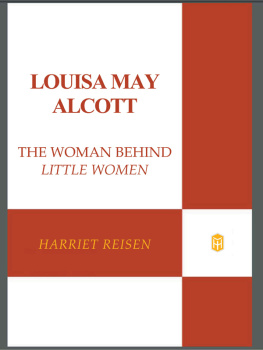
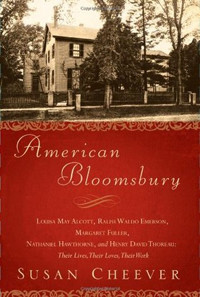
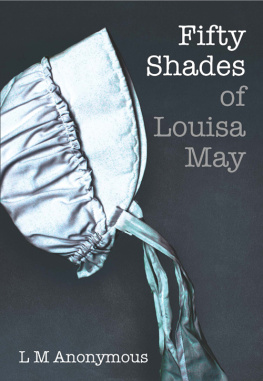
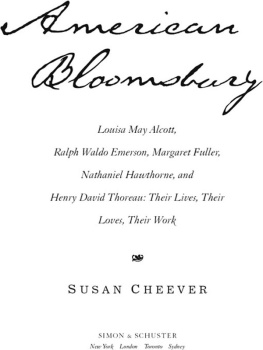

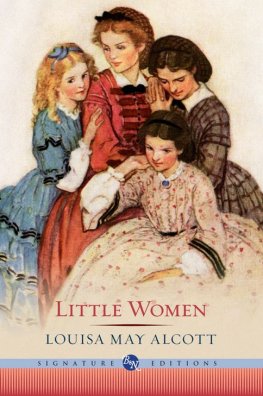

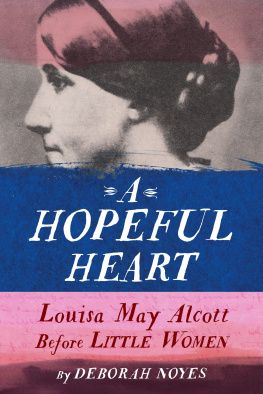


![Alcott - Louisa May Alcott: [a personal biography]](/uploads/posts/book/163779/thumbs/alcott-louisa-may-alcott-a-personal-biography.jpg)

